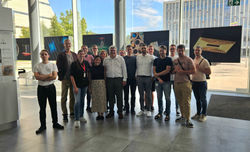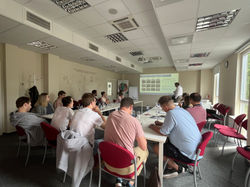Optical Coating Workshops
Join us for various course offerings presented by Dr. James Oliver who has over 30 years in the optical coating industry with 20 years of experience teaching thin-film uniformity and coating design. Combining his vast experience in optical technology, academia, and defense & aerospace there is something for everybody to learn in the offered workshops.
Dr. James Oliver has taught optical coating design courses and short courses for over 20 years, including as an Assistant Professor at the University of Rochester’s Institute of Optics, as part of the Institute’s Summer School, and at various technical conferences. His specialties are based primarily on electron-beam evaporation, including thin-film uniformity and coatings for high-peak-power laser applications.
 |  |  |  |
|---|---|---|---|
 |
Upcoming Events
CONTACT US TODAY TO SCHEDULE AN IN-HOUSE DESIGN WORKSHOP!
Course Offerings
Optical Coating Uniformity
Optical coating deposition typically leads to differences in the film thickness as a result of the substrate size, shape, deposition source, and any motion that might take place during deposition. This variation of thickness uniformity directly impacts the spatially dependent performance of the optics being coated, the potential capacity (or yield) of the substrates that can be loaded for deposition, and the manufacturing tolerance of the system (impacting the complexity of coating designs that can be considered). Unfortunately, most coating systems are not designed based on the deposited uniformity, nor are the resulting coatings adequately characterized to identify the true magnitude of the film variations. This lecture reviews the calculation/modeling of film uniformity, primary sources of error, the characterization of nonuniformity, and approaches to yield highly uniform optical coatings.
Laser Damage
Laser-induced damage in optical coatings poses a limitation on the energy/fluence/power/intensity handling capabilities of an optical system. An understanding of laser damage is necessary in order to inform our approach to optical coating design for laser applications, based on the selection of materials, standing-wave electric-field intensity, impact of defects, and specialized approaches to modify traditional materials. This lecture provides a basis for design and deposition of high-intensity laser coatings, with guidance as to the relevant details that should be incorporated into the design, deposition, and measurement of coatings for laser applications.
Thin Film Stress & Mitigation
Thin-film stresses not only distort the surface figure of coated optics, but may lead to catastrophic failure of the coating for sufficiently high stresses. Stresses are a particular concern for large optics, thin optics, and energetic deposition techniques. This lecture discusses the types and sources of thin-film stress, the impact on the coated optic, and methods to mitigate the impact on the optical performance. Comparisons of different deposition methods will be made, as well as the considerations of substrate size, material, and post-deposition processing.
Optical Coating Design
The design of optical coatings incorporates aspects of materials, electromagnetic theory, and an understanding of thin-film deposition processes. This 2-day design course starts with a basic understanding of materials-based issues, including index of refraction, dispersion, absorption, and substrate materials. These building blocks are then used to develop optical coating designs, from basic single-layer/multilayer antireflective coatings, to high reflector coatings, and optical filters. Since an emphasis is placed on understanding “Why?”, not simply providing basic recipes, graphical and manual calculations are used to aid the selection of appropriate materials, choices of layer thicknesses, and expected performance.
This course provides a fundamental understanding of optical coating design and performance. It is well suited for those new to optical coating design with a basic math/science background, as well as those more experienced in the field seeking formal training and insight into coating design.
Optical Characterization & Testing
If you can’t measure it, you can’t make it – this fundamental approach to manufacturing makes a systematic approach to adequately characterize optical coatings necessary. Standard equipment used in coating facilities poses limitations on the accuracy and precision of the measurements performed. Characterization tools for the optical performance, thin-film stresses, laser-induced damage, and other criteria will be discussed, in order to better understand the measurement approach needed to ensure specifications are fulfilled.
Who should attend?
_edited.png)

